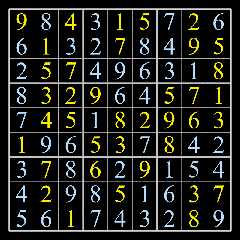|
 |
Good evening everyone
The attached image is a Sudoku grid.
It's not just numbers and lines, it's solving a Sudoku grid.
The starting grid is defined as follows in the code :
#declare board = array[SIZE][SIZE] {
{0,8,0,3,0,0,7,0,6},
{6,0,3,2,0,8,4,0,0},
{2,0,0,4,9,6,3,1,0},
{8,0,0,0,6,4,0,0,0},
{7,0,0,1,0,0,0,0,0},
{0,9,6,0,0,7,0,4,2},
{3,0,8,0,2,0,1,5,4},
{4,0,9,8,0,1,6,0,0},
{5,6,0,7,4,3,2,0,9}
}
The starting digits in yellow, solution digits in blue.
Everything runs smoothly and quickly.
For this grid, the times are :
- Parse Time : 0.124 sec
- Render Time : 1.070 sec
on an old Intel Core i5, 6 cores.
All seemed well, but, but... the greater the difficulty (fewer and fewer
starting digits), the greater the level of recursivity of the main
function and the POV hang with the tragic message "Too many nested
conditionals or macros." :(
The same code in C works without a hitch whatever the level of difficulty
It's true that POV isn't really designed for big calculations.
I'm well aware that I'm overstepping my boundaries.
By the way, just to understand, what limits the level of nested calls?
Memory? (It's true that in 1986, machines didn't have much memory.)
So I need to find another method without recursive calls. The little
information I've found on the web suggests replacing recursive calls
with a loop... hum... hum...
I think I'm going to have a big headache this weekend!
If anyone's interested, I've also attached the text file containing the
debug stream redirection.
--
kurtz le pirate
compagnie de la banquise
Post a reply to this message
Attachments:
Download 'sudoku_solver.txt' (2 KB)
Download 'sudoku_solver_display.png' (159 KB)
Preview of image 'sudoku_solver_display.png'

|
 |




![]()